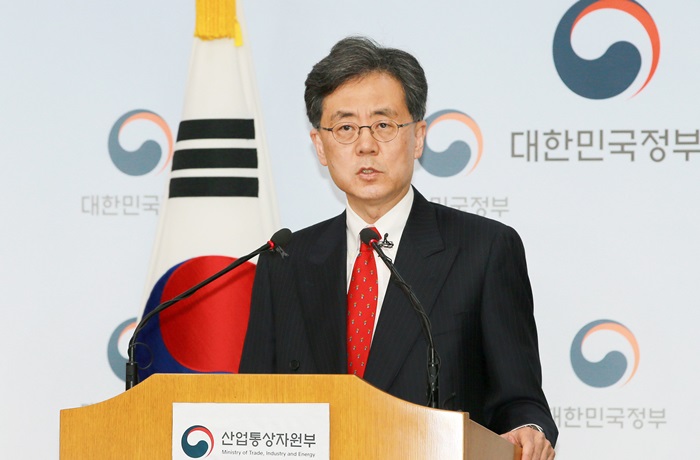
Minister for Trade Kim Hyun-chong briefs the press on the negotiations that took place concerning the revision of the Korea-U.S. FTA and U.S. steel tariffs, at the Government Complex-Seoul in Jongno-gu District, Seoul, on March 26. (Ministry of Trade, Industry and Energy)
By Kim Tae-won and Yoon Sojung
Korea has confirmed its exemption from the U.S.' 25 percent tariff on steel, and has agreed to an early revision of the Korea-U.S. FTA, removing uncertainties concerning export to the U.S. market.
Minister for Trade Kim Hyun-chong said on March 26 during a press briefing at the Government Complex-Seoul that, “In last-minute negotiations with the U.S. trade representative (USTR), Korea was confirmed as the first country to get a permanent exemption from the 25 percent tariff on steel imports to the U.S.”
“After May 1, the end of the temporary exemption period, Korea will be able to get an exemption from the 25 percent tariff that will apply to a quota of 2.68 million tons of steel exports to the U.S. per year, which is equivalent to 70 percent of Korea’s regular annual exports to the U.S. over the past three years,” said Kim.
In regard to the revision of the Korea-U.S. FTA, especially concerning the automobile sector, the most controversial sector where the two sides showed the most difference in positions, Minister Kim said that Korea and the U.S. agreed to extend the U.S. tariffs on Korean pickup trucks by 20 years, until 2041. U.S. automakers will be able to bring into the Korean market 50,000 vehicles, a change from the existing 25,000 per automaker per year, that only meet U.S. safety and environmental standards, Kim said.
The two sides also agreed to not make any further changes to rules governing agricultural markets, a sensitive area for Korea.
Trade Minister Kim said, “We have removed the two biggest uncertainties through these negotiations.”
“I believe this will help Korean firms to trade stably with the U.S., without concern,” said Kim.
twkim0717@korea.kr
Most popular
- 2 Egyptian sisters reflect on 10 years as Honorary Reporters
- Korea Welcome Week for foreign tourists set from April 25-May 16
- Actor Bae Doona's first romcom in decade to hit theaters in May
- Korea.net welcomes 2025 K-influencers, Honorary Reporters
- 2025 Honorary Reporter class pledges to spread 'real Korea' worldwide
